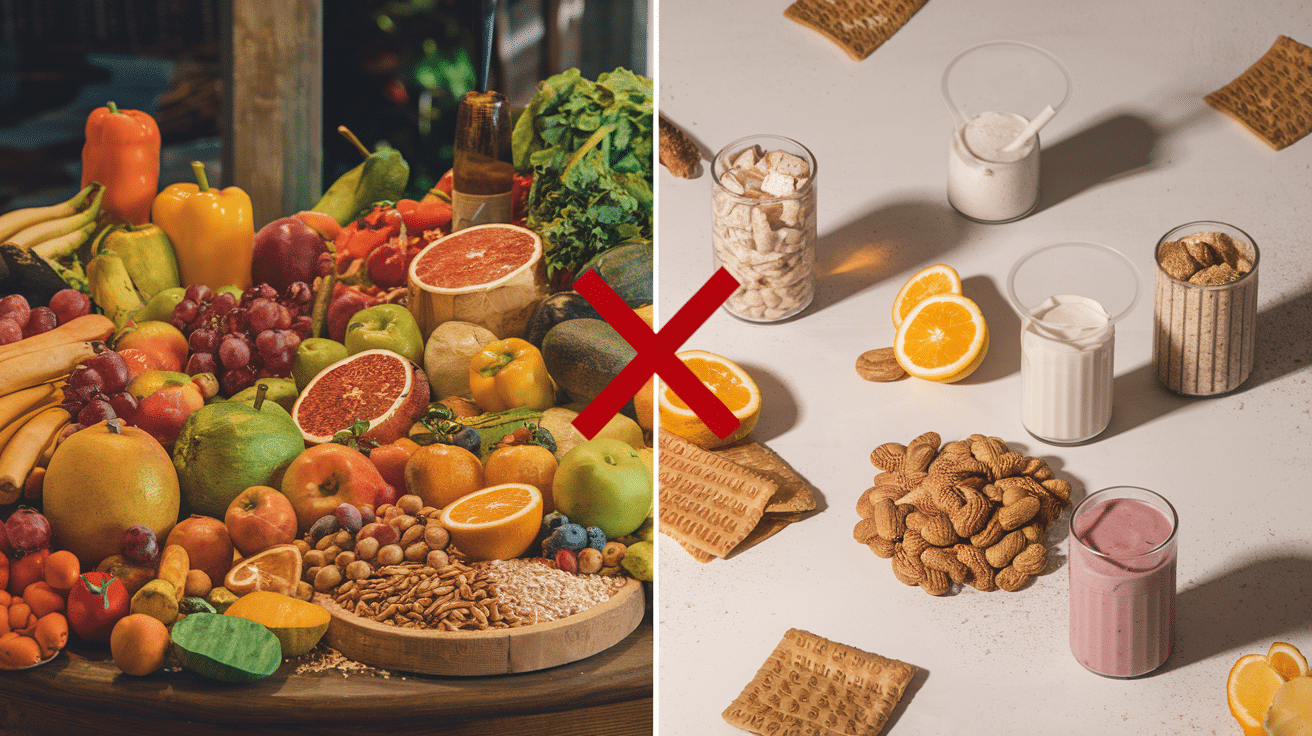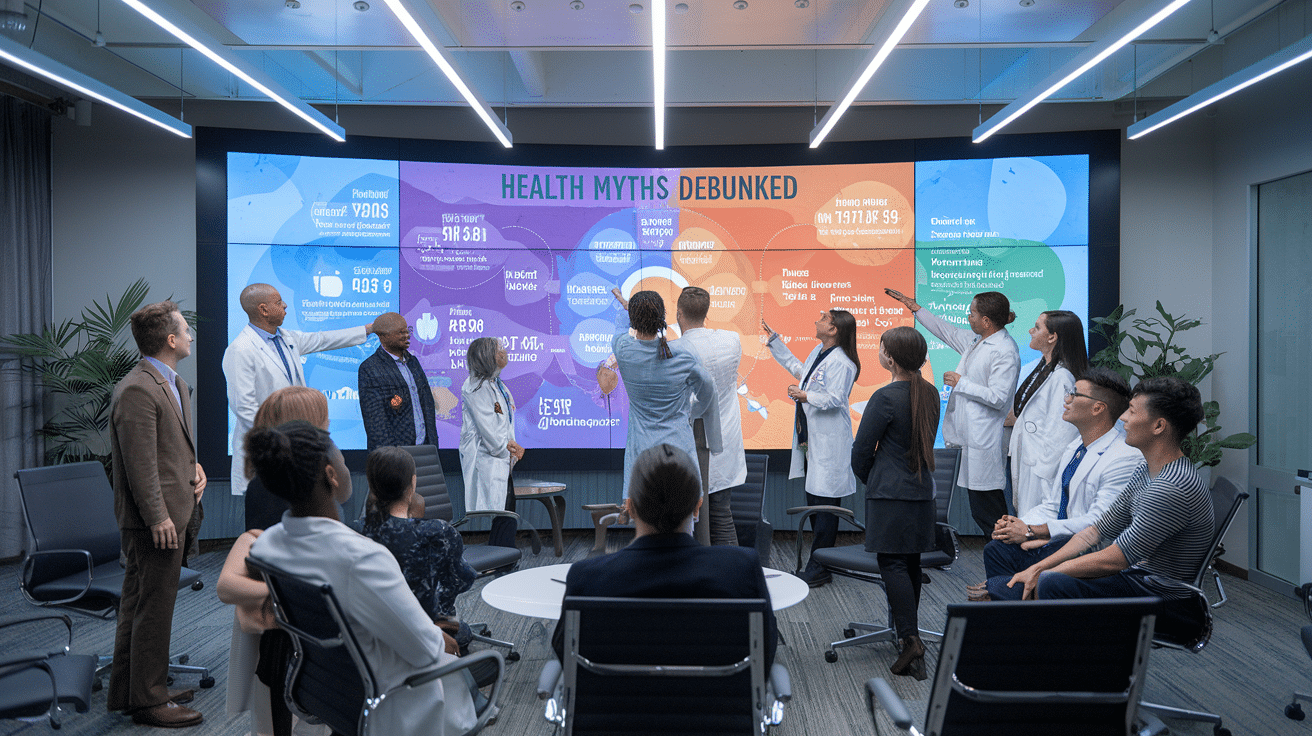Have you ever found yourself believing a health “fact” that seemed too good to be true? 🤔 You’re not alone! In today’s world of viral social media posts and clickbait headlines, it’s becoming increasingly difficult to separate health facts from fiction. But did you know that some of these widely circulated health myths could actually be harming your well-being?
From nutrition myths that might be sabotaging your diet to exercise misconceptions hindering your fitness progress, these false beliefs can have real consequences. 💪🍎 Even worse, some myths about mental health and vaccines continue to perpetuate stigma and misinformation, potentially putting your health at risk. It’s time to set the record straight and arm yourself with the truth.
In this eye-opening blog post, we’ll dive deep into six key areas where health myths run rampant. You’ll discover the real facts behind nutrition, exercise, sleep, mental health, immunity, and aging. Get ready to challenge your assumptions and learn how to make truly informed decisions about your health. Are you prepared to debunk these potentially harmful myths once and for all? Let’s get started!
The Truth About Nutrition Myths

Debunking the “Fat-Free is Healthy” Claim
You might think that reaching for fat-free products is the key to a healthy diet, but this common myth can actually harm your health. Not all fats are created equal, and some are essential for your body’s proper functioning.
Here’s a breakdown of different types of fats and their impact on your health:
| Fat Type | Effect on Health | Examples |
|---|---|---|
| Unsaturated | Beneficial | Avocados, nuts, olive oil |
| Saturated | Consume in moderation | Dairy, red meat |
| Trans | Harmful | Processed foods, margarine |
The Reality of Detox Diets and Cleanses
You’ve probably heard about detox diets promising to “cleanse” your body, but the truth is, your body has its own built-in detoxification system. These trendy diets often:
- Lack scientific evidence
- May lead to nutrient deficiencies
- Can cause dehydration and electrolyte imbalances
Instead of relying on these quick fixes, focus on supporting your body’s natural detoxification processes through:
- Staying hydrated
- Eating a balanced diet rich in fruits and vegetables
- Getting regular exercise
- Ensuring adequate sleep
Exposing the Dangers of Extreme Fad Diets
While promising rapid weight loss, extreme fad diets can pose serious risks to your health. These diets often severely restrict calorie intake or eliminate entire food groups, leading to:
- Nutritional deficiencies
- Metabolic slowdown
- Muscle loss
- Increased risk of disordered eating
Unmasking Superfoods: Hype vs. Reality
You’ve likely encountered the term “superfood” in health magazines and social media. While these foods often have nutritional benefits, it’s important to understand that no single food can provide all the nutrients your body needs.
Instead of focusing on specific superfoods, aim for a diverse diet that includes a variety of nutrient-dense foods. This approach ensures you’re getting a wide range of vitamins, minerals, and other beneficial compounds to support your overall health.
Exercise Misconceptions That May Hinder Your Progress
The Myth of Spot Reduction
You’ve probably heard claims about exercises that target fat in specific areas of your body. However, the truth is that spot reduction is a myth. Your body burns fat from all over, not just the area you’re working on. Here’s what you need to know:
- Fat loss occurs throughout the body when you create a calorie deficit
- Targeted exercises build muscle in specific areas, but don’t burn fat locally
- A combination of overall fat loss and muscle building creates the appearance of spot reduction
Debunking “No Pain, No Gain”
While pushing yourself is important, the idea that exercise must be painful to be effective is misguided and potentially dangerous. Here’s a breakdown of what you should consider:
| Pain Type | What It Means | Action to Take |
|---|---|---|
| Mild discomfort | Normal during exercise | Continue with caution |
| Sharp or intense pain | Potential injury | Stop and seek advice |
| Persistent pain | Overuse or injury | Rest and consult a professional |
Correcting Cardio-Only Fitness Beliefs
Many people believe that cardio is the only way to get fit, but this overlooks the crucial benefits of strength training. A well-rounded fitness routine includes both:
- Cardiovascular exercise: Improves heart health and burns calories
- Strength training: Builds muscle, boosts metabolism, and improves bone density
- Flexibility work: Enhances range of motion and prevents injuries
By incorporating all these elements, you’ll achieve better overall fitness and avoid the pitfalls of a cardio-only approach. Remember, variety in your workouts not only prevents boredom but also ensures you’re targeting all aspects of your physical health.
Sleep and Rest: Separating Fact from Fiction
The Truth About “Catching Up” on Sleep
You might think you can make up for lost sleep by sleeping in on weekends, but this isn’t entirely accurate. While you can reduce your sleep debt slightly, you can’t fully recover from chronic sleep deprivation. Here’s what you need to know:
- Short-term recovery: You can recover from a night or two of poor sleep
- Long-term effects: Chronic sleep debt has lasting impacts on health
- Quality over quantity: Focus on consistent, quality sleep rather than catching up
Debunking the 8-Hour Sleep Rule
The notion that everyone needs exactly 8 hours of sleep is oversimplified. Your sleep needs are individual and can vary based on several factors:
| Factor | Impact on Sleep Needs |
|---|---|
| Age | Younger adults may need more sleep |
| Activity Level | More active individuals might require more rest |
| Genetics | Some people naturally need less sleep |
| Health Conditions | Certain conditions may increase sleep requirements |
Napping: Friend or Foe?
Napping can be beneficial when done correctly, but it’s not for everyone. Here’s a quick guide to napping:
- Keep naps short (10-20 minutes) to avoid grogginess
- Nap early in the afternoon to prevent nighttime sleep disruption
- Be consistent with your napping schedule if you choose to nap regularly
The Impact of Blue Light on Sleep Quality
You’ve likely heard about the negative effects of blue light on sleep, but what’s the truth? Blue light, especially from screens, can indeed interfere with your sleep cycle by suppressing melatonin production. To mitigate this:
- Use blue light filters on devices
- Avoid screens 1-2 hours before bed
- Opt for warm, dim lighting in the evening
Now that you understand these sleep facts, let’s explore how mental health myths can perpetuate stigma and hinder proper care.
Mental Health Myths That Perpetuate Stigma
Addressing the “Snap Out of It” Misconception
You’ve likely heard someone tell a person with depression to “just snap out of it” or “choose to be happy.” This harmful misconception undermines the complexity of mental health conditions and can make those struggling feel misunderstood and invalidated.
Mental health disorders are not a choice or a sign of weakness. They’re real medical conditions that require proper treatment and support. Here’s why you can’t simply “snap out” of mental health issues:
- Brain chemistry: Mental health conditions often involve imbalances in neurotransmitters
- Genetic factors: Some disorders have a hereditary component
- Environmental triggers: Stress, trauma, and life events can contribute to mental health issues
- Physiological changes: Mental health conditions can alter brain structure and function
| Myth | Reality |
|---|---|
| “Just think positive” | Professional treatment and support are often necessary |
| “It’s all in your head” | Mental health conditions have physical and psychological components |
| “You’re just being lazy” | Mental health issues can significantly impact energy and motivation |
Debunking the Link Between Violence and Mental Illness
You might have encountered media portrayals or public discussions that perpetuate the myth that individuals with mental illness are inherently violent. This misconception is not only inaccurate but also harmful, as it contributes to stigma and discrimination.
Research consistently shows that the vast majority of people with mental health conditions are not violent. In fact, they’re more likely to be victims of violence than perpetrators. Here are some key points to consider:
- Most violent acts are committed by individuals without diagnosed mental health conditions
- People with mental illness are 10 times more likely to be victims of violent crime than the general population
- Factors like substance abuse and a history of violence are better predictors of violent behavior than mental illness alone
Correcting Beliefs About Medication Dependency
Now, let’s address another common myth: the belief that taking medication for mental health conditions leads to dependency or weakness. This misconception often prevents people from seeking necessary treatment.
Vaccine and Immunity Misinformation
Exposing the Autism-Vaccine Myth
You’ve likely heard the claim that vaccines cause autism, but it’s crucial to understand that this is a dangerous myth. Numerous large-scale studies have consistently shown no link between vaccines and autism. The original study suggesting this connection was found to be fraudulent and has been thoroughly debunked.
| Myth | Fact |
|---|---|
| Vaccines cause autism | No scientific evidence supports this claim |
| MMR vaccine is linked to autism | Large studies show no connection |
| Vaccine ingredients are harmful | Ingredients are safe in amounts used |
Clarifying How Vaccines Actually Work
Understanding how vaccines work can help dispel many misconceptions. Vaccines stimulate your immune system to produce antibodies, just as it would if you were exposed to the disease. This prepares your body to fight the disease without you having to get sick first.
Key points about vaccine function:
- Introduce harmless form of pathogen
- Trigger immune response
- Create memory cells for future protection
Addressing Natural Immunity vs. Vaccine-Induced Immunity
You might wonder if natural immunity is better than vaccine-induced immunity. While both can be effective, vaccine-induced immunity is generally safer and more reliable. Natural immunity comes with the risk of severe illness and complications, which vaccines help you avoid.
Debunking Common Flu Shot Misconceptions
Many myths surround the flu shot, but getting vaccinated remains your best protection against influenza. Contrary to popular belief, the flu shot can’t give you the flu. It’s also important to get vaccinated annually as the virus strains change each year.
Now that you understand these crucial facts about vaccines and immunity, let’s explore some common misconceptions about aging and longevity.
Aging and Longevity: Fact-Checking Popular Beliefs
The Truth About Anti-Aging Products
You’ve probably seen countless advertisements for “miracle” anti-aging creams and serums. But do these products really live up to their promises? Let’s separate fact from fiction:
| Claim | Reality |
|---|---|
| Reverses aging | Can’t reverse aging, may temporarily improve appearance |
| Eliminates wrinkles | May reduce appearance of fine lines, can’t eliminate deep wrinkles |
| Works for everyone | Results vary widely based on individual skin types |
| Instant results | Most products require consistent use over time |
While some anti-aging products can improve skin hydration and texture, there’s no magic solution to stop the aging process. Focus on these evidence-based strategies instead:
- Wear sunscreen daily to protect against UV damage
- Maintain a healthy diet rich in antioxidants
- Stay hydrated and get adequate sleep
- Manage stress through relaxation techniques
Debunking the “Use It or Lose It” Brain Myth
You’ve likely heard that your brain will deteriorate if you don’t constantly challenge it. While mental stimulation is beneficial, the “use it or lose it” concept is oversimplified. Your brain remains plastic throughout life, capable of forming new neural connections.
Correcting Misconceptions About Metabolism and Age
Many believe that metabolism inevitably slows down as you age, leading to weight gain. However, research shows that metabolism remains relatively stable between ages 20 and 60. The real culprits behind age-related weight gain are often:
- Decreased physical activity
- Loss of muscle mass
- Changes in hormone levels
- Alterations in eating habits
To maintain a healthy metabolism as you age, focus on strength training to preserve muscle mass and stay physically active. Remember, your lifestyle choices play a significant role in how you age, dispelling the myth that aging is solely determined by genetics.

Navigating the world of health information can be challenging, but armed with accurate knowledge, you’re better equipped to make informed decisions about your well-being. By debunking common myths surrounding nutrition, exercise, sleep, mental health, vaccines, and aging, you’ve taken an important step towards a healthier lifestyle. Remember, science-based facts are your best allies in maintaining optimal health and longevity.
As you move forward, stay curious and critical. Always seek information from reputable sources and consult healthcare professionals for personalized advice. Your health journey is unique, and by separating fact from fiction, you’re empowering yourself to make choices that truly benefit your body and mind. Keep questioning, keep learning, and keep prioritizing your health based on solid, evidence-based information.


